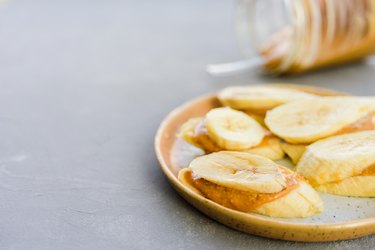
Choosing snacks while managing your irritable bowel syndrome (IBS) may seem challenging at first, especially if you rely on packaged, processed snack foods. But there are many simple fresh choices you can try that are satisfying, nourishing and IBS-friendly.
Video of the Day
Video of the Day
First, Foods to Avoid
Researchers have found that following what's called a low-FODMAP diet translates to fewer painful IBS symptoms, such as abdominal pain and bloating, according to a review of existing research published in August 2017 in Nutrients.
FODMAP is the acronym for fermentable oligosaccharides, disaccharides, monosaccharides and polyols, and a low-FODMAP diet is one that limits foods in these categories, primarily certain carbs.
Food categories that are restricted on the low-FODMAP diet, according to researchers at Monash University in Australia, include:
- Fruits: Apples, apricots, blackberries, cherries, boysenberries, figs, grapefruit, lychees, mangos, nectarines, peaches, pears, plums and pomegranates
- Vegetables: Asparagus, avocados, artichokes, savoy cabbage, corn, cauliflower, garlic, leeks, mushrooms, onions, spring onion, peas and sweet potato
- Nuts: pistachios and cashews
- Grains/breads: Wheat and wheat products including flour, rye, pumpernickel, muesli, barley, pasta and couscous
- Legumes: Beans and peas
- Dairy: Full-lactose cow's milk, custard, milk powder and evaporated milk (for those who don't digest lactose well)
- Sweets: Berry jams, honey, fruit bars, products made with high fructose corn syrup and artificial sweeteners like sorbitol and mannitol
- High-fat foods
Making daily menus of meals and snacks that forgo these foods may make IBS more manageable.
Foods for Snacking
Snacks can be an important part of any diet, but "it is important to pay attention to the recommended serving sizes when choosing snacks, as some foods are no longer considered 'low FODMAP' when consumed in large quantities," explains Katelyn Ferguson, RDN, a registered dietitian nutritionist at the Medical University of South Carolina in Charleston.
Snacks that she recommends include half a banana with 2 tablespoons of peanut butter, 15 almonds with a slice of Swiss or cheddar cheese and lactose-free cottage cheese with 1/2 cup of strawberries. Want more tasty ideas? Try:
- 20 blueberries and eight almonds
- Two small kiwi fruit and 15 macadamia nuts
- Four slices of turkey and 1/2 cup cucumber
- 1/2 cup puffed rice cereal with lactose-free milk and five sliced strawberries
- A smoothie made with 1/2 cup spinach, lactose-free milk, raspberries, blueberries and ice
- Eggplant dip made with roasted eggplant, tahini, lemon juice, olive oil and salt and eaten with sourdough spelt bread triangles
- Plain rice cake topped with natural peanut butter
- Cinnamon spice instant oatmeal
- Hard-boiled egg with one medium orange
- 15 olives
- Plain roasted seaweed snacks
A Few Caveats
A banana is a portable and simple snack food that is generally safe to eat when you have IBS as long as you shop wisely. "An unripe yellowish-green banana is generally well tolerated and can encourage the growth of good bacteria in our gut," says Chanel Love, RD, LD, a dietitian in Houston. However, she warns that the riper the banana, the more likely it is that it will trigger IBS symptoms for someone sensitive to fermentable carbohydrates.
While popcorn is generally considered low FODMAP when consumed in an appropriate portion, or 2 ounces weighed unpopped, according to Monash University, it still may trigger symptoms in certain people with IBS. Also, staying away from artificial flavorings and opting for natural herbs might be safer.
Paying attention to how you feel after eating any specific food should help you navigate what should be on your good-snacks list. Keeping notes on this in a food diary will help you navigate snack time while reducing the risk of triggering side effects that you're trying to avoid.
- Chanel Love, RD, LD, dietitian, Houston
- Nutrients: “Low-FODMAP Diet Improves Irritable Bowel Syndrome Symptoms”
- Katelyn Ferguson, RDN, registered dietitian nutritionist, Medical University of South Carolina, Charleston
- Monash University: “High and Low FODMAP Foods”
- Monash University: “Going to the Movies? Can I Snack on Popcorn?”